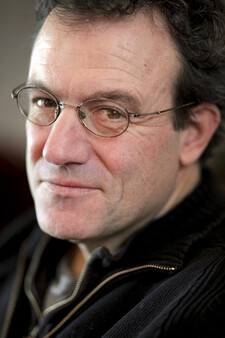Journalist Charles Siebert on Humanity’s Wonder for, and Wounding of, Animals
The Law, Ethics & Animals Program (LEAP) at Yale Law School kick-started the spring 2020 semester by hosting award-winning author, poet and journalist Charles Siebert on Tuesday, January 14, for a talk entitled, “What on Earth Are They Saying?” The event was cosponsored by LEAP, the Poynter Fellowship in Journalism at Yale, and the Yale Animal Law Society.

WATCH: A video of Charles Siebert’s talk
LISTEN: A podcast interview featuring Charles Siebert
Siebert recounted stories of his many experiences visiting with, and writing about, non-human animals throughout his journalistic career, and spoke about what his stories collectively reveal about the human animal, the common biology and languages that we share with other creatures, and the importance of extending our empathy beyond our own species.
A predominant theme that runs throughout his writing on human-animal relationships is: “the inability of humans to see ourselves as animals, and animals as themselves; as individuals,” according to Siebert. This theme was evident in his recollected interludes with characters such as a retired circus chimpanzee named Roger who preferred the company of humans to his own species, traumatized orphaned parrots at a therapy program where they work with traumatized military veterans, and an isolated captive elephant who used his trunk to transform his trumpeting into an impression of human voice.
Siebert’s talk also emphasized animals' vivid emotional lives and the ways in which captivity wounds them. Siebert recently authored a cover story for The New York Times Magazine about the abduction and importation of African elephants by U.S. zoos. His article was a driving factor behind the passage of a new Convention on International Trade in Endangered Species resolution that prohibits the future importation of wild elephants for zoo exhibits. Still, Siebert noted all the damage humans do to the animals that they don’t abduct, such as wild elephants experiencing PTSD and societal collapse. “The fact that we can traumatize a whole species in the wild is pretty sobering,” Siebert said.
Siebert said he draws much of the inspiration for his writing from the academic work of scientists studying non-human animals. As Siebert quipped at one point during his talk, “If scientists were better writers, I would be out of a job.” Although some animal science remains reductionist, Siebert said science is helping humans to realize the complexity of non-human animals and to appreciate that animals share many features once thought to be uniquely human. Parrots, for instance, are known to display high social intelligence. During a visit to the parrot therapy program, Siebert described his astonishment at the birds’ ability to recognize veterans who suffered traumas similar to their own. Studies indicate that parrots living in the jungle each have their own name, or “signature call,” which other members learn and use to call each other.
Siebert is a Professor of Practice of Literature and Creative Writing at New York University Abu Dhabi, as well as an accomplished essayist, journalist, poet, and author. He is a contributing writer to The New York Times Magazine and has also written for The New Yorker, Harper’s Magazine, and National Geographic, among other publications. His three critically acclaimed memoirs — The Wauchula Woods Accord: Toward A New Understanding of Animals, A Man After His Own Heart, and Wickerby: An Urban Pastoral — and other writings offer insight into our relationships with animals, the natural world, and each other.
Siebert’s talk drew wide interest from Yale and New Haven communities, overflowing the 75-person lecture hall. At the end of his talk, many audience members appeared to be visibly moved by the intimate relations Siebert had forged with non-human animals. “The beauty of your words hits us like waves,” one audience member commented.
The Law, Ethics & Animals Program (LEAP) at Yale Law School is a new initiative that leads and coordinates a diverse program of activities. It seeks to contribute to defining, expanding, and advancing the field of animal law. Recent and upcoming speakers include Ted Hamilton, Sheila Jasanoff, and Timothy Pachirat.
By Sebastian Quaade


